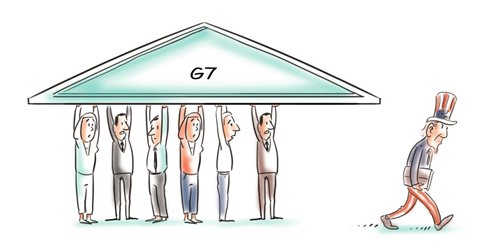
(Photo: Global Times)
At the recent G7 Finance Ministers and Central Bank Governors' Meeting, the US became the target of criticism. Host country Canada's Finance Minister Bill Morneau said in a "chair's summary" that the six other member states recognized that the US restrictions on steel imports had put G7's "collaboration and cooperation at risk."
The G7 was founded around the first oil crisis in the 1970s. Then, the Group of Seven accounted for 80 percent of the world GDP. When the seven major economies decided to coordinate macroeconomic policies and took unified steps, their decisions had a huge impact on the world economy.
In the mid-1980s, the G7 finance ministers and central bank governors met and took a decision on the depreciation of the US dollar and the sharp appreciation of the Japanese yen and the German mark.
However, with the advent of globalization and the rapid rise of emerging economies, G7's influence in the global economy has been declining since the 1990s. Skepticism over its ability to influence the global economy has arisen in these countries.
As a result, former Canadian finance minister Paul Martin enlisted 20 countries and proposed the establishment of the G20 in the late 1990s. Although the G20 finance ministers and central bank governors' meeting has been held once a year since 1999, it didn't gain worldwide attention until the outbreak of the global financial crisis in 2008 when the group held its first leaders' summit.
The G20 consists of the G7 member countries and a group of emerging economies such as China and India, which account for 85 percent of the global GDP. In 2015, the G7's share of global GDP dropped to 47 percent, while the share of emerging economies rose rapidly. The BRICS nations had a combined GDP of 23 percent of the world total and contributed to more than half of global growth.
In fact, since 2008, the G20 has overtaken the G7 in dealing with the crisis. Subsequently, the G20 has become an important part of the new global governance framework. Many global governance reforms, including the investment management reform of the World Bank and the International Monetary Fund, were initiated within the framework of the G20.
Although it seems that the role of the G20 in global governance has outdone that of the G7, the club of the developed world still holds meetings of finance ministers and central bank governors every year, as well as leaders' summits.
After the Cold War, as a "reward" for Russia's initiative on "self-destruction" and disintegration the Soviet Union, the G7 invited Russia, symbolically turning the G7 into G8. However, Russia mainly participated in politics and security-related discussion.
The original purpose of the G7 - coordination of macroeconomic policies - was still under the aegis of the G7 finance ministers and central bank governors meeting that Russia did not attend. When the Ukrainian crisis broke out, Russia was jettisoned and G8 again became G7.
The G7 was set to mainly coordinate monetary and fiscal policies. However, following the 2008 financial tsunami, without negotiating with other six central banks, the US Federal Reserve unilaterally cut the interest rate to zero, launched quantitative easing and purchased a large number of treasury bonds and related securities.
Later, the European Central Bank and the Bank of Japan adopted negative nominal interest rates and quantitative easing, and it seemed that they did not solicit opinion of the Fed either.
These "unconventional" monetary policies were not enforced uniformly under the G7 framework, but for their respective interests. There were more cases of discord in the following days. For example, after the Fed ceased quantitative easing, it began an interest rate hike cycle and tightened monetary policy.
Nevertheless, the European Central Bank and the Bank of Japan still maintained quantitative easing and negative interest rates. Were these mismatches simply due to cyclical disparity or because there were more hidden issues?
After taking office, President Donald Trump has announced several withdrawals of the US from international deals. What if one day Trump feels that the G7 is useless and only serves as a platform for others to criticize the US? Will he let the US withdraw from the G7, too?


